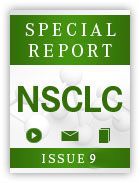Immunotherapy Becoming Mainstay of NSCLC Therapy
Immunotherapy is fast becoming the new standard of care for non-small-cell lung cancer alongside developing research in the field.
NSCLC

Roy S. Herbst, MD, PhD
Immunotherapy is fast becoming the new standard of care for nonsmall-cell lung cancer (NSCLC) alongside developing research in the field. Until recently, patients with stage IV NSCLC who received the current standard of care, a platinum agent combined with a third-generation agent, such as gemcitabine, vinorelbine, or pemetrexed, have had only a 5-year survival rate of 1%.1However, patients with metastatic disease have shown significant responses to immunotherapy with programmed death-1 (PD-1) and programmed death-ligand 1 (PD-L1) inhibitors.
Nivolumab, the first-in-class PD-1blocking agent, and pembrolizumab, a PD-L1 inhibitor, were approved earlier this year (March 2015 and October 2015, respectively) by the FDA for the treatment of metastatic NSCLC in patients with progression on or after platinum-based chemotherapy. The two agents were approved in 2014 for use in the treatment of advanced melanoma.
Phase III Trials
The results of the CheckMate 017 trial, a randomized, open-label, international, phase III study, evaluated the efficacy and safety of nivolumab compared with docetaxel in patients with advanced squamous-cell NSCLC with disease progression.2The median overall survival (OS) was 9.2 months with nivolumab versus 6.0 months with docetaxel. The 1-year OS rate was 42% among patients taking nivolumab versus 24% in the docetaxel group. The response rate was also better among the nivolumab group, 20% versus 9% with docetaxel. The risk of death was 41% lower in the nivolumab cohort than the docetaxel group.
Similar results from a second phase III trial, CheckMate 057, were presented at the American Society of Clinical Oncology (ASCO) 2015 Annual Meeting and at the European Cancer Congress 2015. The response from the oncologists was quite positive, some even calling the treatment “a game changer.”3
In this study, the median OS was 12.2 months in patients who received nivolumab compared with 9.4 months in patients who received docetaxel. The OS rate at 1 year was 51% for the nivolumab cohort versus 39% for the docetaxel group.4The rate of progression-free survival at 1 year was also higher with nivolumab (19%) than with docetaxel (8%).
More Agents Under Study
Similar agents are currently under study. Atezolizumab, also known as MPDL3280A, is another PD-L1 inhibitor and has received breakthrough designation from the FDA for use among patients with NSCLC who have PD-L1 markers, and whose disease did not stabilize after undergoing standard chemotherapy treatment.5Other agents undergoing clinical trials include:6
- Bavituximab, a mAb: phase III trial testing with docetaxel and docetaxel alone for patients with late-stage non-squamous NSCLC;
- Patritumab, an HER3-targeted mAb: phase III trial in combination with erlotinib for patients with locally advanced or metastatic NSCLC;
- Rilotumumab, an mAb targeting hepatocyte growth factor (HGF): phase II/III trial as second-line therapy for patients with squamous cell NSCLC, and phase I/II study with erlotinib for patients with recurrent or progressive NSCLC previously treated with chemotherapy;
- Cetuximab (Erbitux), a mAb targeting the epidermal growth factor receptor (EGFR): phase II trial for patients with stage IIIB NSCLC that can be removed surgically;
- IMMU-132, an antibody drug conjugate (ADC): phase I/II trial for patients with epithelial cancers, including NSCLC and SCLC; and
- Demcizumab, a mAb targeting Delta-like ligand 4 (DLL4): phase I/II trial in combination with chemotherapy for patients with untreated extensive-stage SCLC.
At this point, there are only experimental biomarkers aside from PD-L1.
"Some people are exploring what is called ‘mutational load,’ where they're actually measuring mutations and variance in tumors, and seeing if that, in fact, correlates,” said Roy S. Herbst, MD, PhD, ensign professor of Medicine (Oncology), chief of medical oncology, and director of the Thoracic Oncology Research Program at Smilow Cancer Hospital, Yale Comprehensive Cancer Center, in an interview withTargeted Oncology. “The more mutations you have, the theory is, the more likely the tumor is to generate an immune response, you have more neoantigens, so that's the approach used by some."
Using Nivolumab and Pembrolizumab in Practice
Nivolumab is approved for use in patients without a biomarker, so physicians can use it in any patient who has refractory NSCLC. “However, I think the data for nivolumab show that it really only works in those patients who have a greater than 1% PD-L1 staining, from a retrospective cohort,” Herbst said. “I would say that my sense is that you can give nivolumab to everyone. Pembrolizumab, you can only give to those patients who have positive biomarkers. As a clinician, I would prefer to give the drug to a patient who I knew had a biomarker that meant they were more likely to have a response.”
Immunotherapy allows physicians to personalize therapy, according to each patient’s profile, Herbst continued. “A few weeks ago, pembrolizumab was approved for lung cancer in patients who have high staining, more than 50% staining of PD-L1,” he explained. Patients who are less than 50% should receive something else, meaning that physicians could triage their patients based on their molecular profile. Since patients often become resistant at some point to therapies, such as kinase inhibitors, immunotherapies might be used with targeted therapy, to reduce the risk of resistance.
Adverse Events and Toxicities
The adverse event (AE) profile of these immunotherapy agents is better than that of traditionally used chemotherapeutic agents.2The most commonly reported immune-related (AEs) for both nivolumab and pembrolizumab are mild fatigue, rash, pruritis, diarrhea, and colitis.7However, oncologists must take into account that with immunotherapy, their patients are going to present with a set of toxicities that oncologists aren’t used to seeing, said Herbst. These include toxicities such as pneumonitis and pericarditis.
AntiPD-1 and PD-L1 agents also have different toxicities than the CTLA-4 agent ipilimumab.8For example, patients receiving CLTA-4 agents have a higher rate of gastrointestinal and dermatological AEs, while those receiving PD-1 and PD-L1 agents experience more pneumonitis and thyroiditis. In an effort to stem these events, it is advised that patients be clinically evaluated, including lab tests, before each cycle of therapy, and that clinicians be comfortable with holding off further therapy until these workups are done.
“Immune therapy has now become a mainstay of lung cancer,” Herbst said. “We have to figure out how to integrate it into all lines of therapy. Certainly, we want to move it frontline if the data support that. We want to think about combinations with targeted therapies.”
References
- American Cancer Society. Lung Cancer (Non-small cell) http://www.cancer.org/acs/groups/cid/documents/webcontent/003115-pdf.pdf, 168. Published 2012. Accessed November 9, 2015.
- Brahmer J, Reckamp KL, Baas P, et al. Nivolumab versus docetaxel in advanced squamous-cell nonsmall-cell lung cancer.N Engl J Med.2015;373:123-135. doi: 10.1056/NEJMoa1504627
- Chustecka Z. Nivolumab in lung cancer shows 'unprecedented' survival. Medscape Nurses Conference News.http://www.medscape.com/viewarticle/845647U. Accessed November 10, 2015.
- Borghaei H, Paz-Ares L, Horn L, et al. Nivolumab versus docetaxel in advanced nonsquamous nonsmall-cell lung cancer.N Engl J Med.2015;373:1627-1639. doi: 10.1056/NEJMoa1507643
- Chustecka Z. Atezolizumab: another immunotherapy active in lung cancer. Medscape Nurses.http://www.medscape.com/viewarticle/851625. Accessed November 9, 2015.
- Lung Cancer. Cancer Research Institute.http://www.cancerresearch.org/cancer-immunotherapy/impacting-all-cancers/lung-cancer. Accessed November 9, 2015.
- Gangadhar TC, Vonderheide RH. Mitigating the toxic effects of anticancer immunotherapy.Nat Rev Clin Oncol.2014;11(2):91-99.
- Teply BA, Lipson EJ. Identification and management of toxicities from immune checkpoint-blocking drugs.Oncology(Williston Park). 2014;28 (suppl 3)30-38.http://www.ncbi.nlm.nih.gov/pubmed/25384885

Multiple Resistance Mechanisms Thwart Efficacy for Third-Generation TKIs in NSCLC
April 7th 2024An important clinical strategy that focuses on improved frontline EGFR TKI regimens may help combat acquired EGFR TKI resistance and further streamline treatment options in subsequent lines, according to Balazs Halmos, MD.
Read More